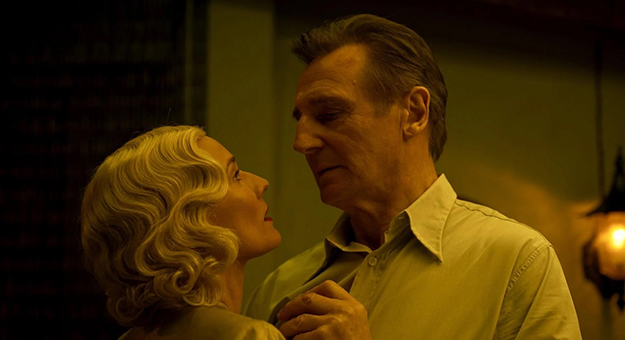Add Liam Neeson to the impressive list of leading men who have played Raymond Chandler's laconic antihero gumshoe Philip Marlowe, a roster highlighted by Dick Powell in Murder, My Sweet (1944), Humphrey Bogart in The Big Sleep (1946), Robert Montgomery in Lady in the Lake (1947), James Garner in Marlowe (1969), Elliott Gould in The Long Goodbye (1973) and Robert Mitchum twice, in Farewell, My Lovely (1975) and The Big Sleep (1978). What a group!
Nobody's ever going to match Bogart's iconic work opposite Lauren Bacall in Howard Hawks' 1946 classic, but Neeson delivers a reliably powerful, world-weary, "I'm too old for this s---!" performance in Neil Jordan's exquisitely photographed and sometimes convoluted but thoroughly enjoyable period piece.
This is the kind of self-aware film noir where we'd be disappointed if there WASN'T a moment where we see the reflection of a neon sign in a puddle, just before a car cuts through the shallow pool of water, making the image shimmy. (Spoiler alert: We're not disappointed.)
Marlowe is based on The Black-Eyed Blonde: A Philip Marlowe Novel (2014), an authorized novel from the esteemed Irish writer John Banville, using the pseudonym Benjamin Black. Still, it's Marlowe. The story is set in and around 1939 Bay City, Los Angeles (though production actually took place primarily in Barcelona and Dublin), with director Jordan (The Crying Game, Michael Collins) and cinematographer Xavi Gimenez lensing the interiors in saturated golden and brown hues. Even when the plot has us feeling as dizzy as Marlowe does after taking a blow to the back of the head, it's a great-looking film.
Neeson's Philip Marlowe is an Irish expat (we learn he saw combat in the First World War, with the Royal Irish Rifles regiment of the British Army), former LAPD cop and now private detective who is hired by one Clare Cavendish (Diane Kruger), the requisite Mystery Blonde with Dubious Intentions, to find Clare's missing lover, Nico Petersen (Francois Arnaud), a prop master at a film studio who was a notorious womanizer and perhaps involved in some shady and dangerous activities. It doesn't take long for Marlowe to learn Nico was killed by a hit-and-run driver just outside an upper-crust country club run by the gentlemanly but clearly nefarious Floyd Hanson (Danny Huston), with the LAPD and coroner confirming it was indeed Nico who was turned into human road kill by an unknown assailant - but Clare insists she has spotted Nico in Mexico after he was supposedly killed, and that must be some other poor sap's ashes in the morgue.
Marlowe's investigation plunges him ever-deeper into the seedy and salacious side of Los Angeles, as we meet a variety of colorful and perhaps not-to-be trusted characters, including Clare's wealthy mother, Dorothy (Jessica Lange), who was once a great Hollywood star; a flamboyant and dangerous gangster named Lou Hendricks (Alan Cumming); Lou's chauffeur and bodyguard Cedric (Adewale Akinnuoye-Agbaje); and Nico's sister, Lynn, (Daniela Melchior), a sex worker who finds her life in danger due to Nico's shady dealings. (Marlowe also relies heavily on a pair of sympathetic coppers, played by Colm Meaney and Ian Hart, to keep him in the loop. The supporting players in this film are outstanding, down to the smaller roles.)
Huston and Neeson are particularly engrossing together, playing two men of a certain size and demeanor who stroll about wearing suits and hats, but have seen and done things one doesn't discuss out loud in polite company. When Marlowe says it must have been quite the disturbing experience for Hanson to have seen Peterson's crushed body in the road, Hanson says, "I've seen men in more disarray than that in which Mr. Petersen was discovered," notes he's a war veteran and says, "Once, after an artillery strike, I found a friend's tooth in my whiskey glass. I drank the whiskey."
"You're a terrible man," says Marlowe.
"He was dead, and I needed the whiskey," comes the reply. That's ridiculous, but kind of great. (The screenplay is from William Monahan, who won an Oscar for The Departed. Everyone involved in this film has credentials.)
Just about every woman Marlowe meets expresses an interest in him, but he keeps begging off, explaining (with very good reason) why this tryst or that assignation would be a really bad idea. Many of the MEN who meet Marlowe comment on how big he is - not that it stops a few of them from trying to take him on, and we know that's a bad idea because even post-Taken, the now 70-year-old Neeson (who was in his late 60s when this was filmed) can crush your head like a grape. The central mystery often gets lost in the weeds, and it feels like the story ends a few beats after its natural conclusion, but thanks to the high-end production values, the juicy script and the vigorous performances from that first-rate cast, it's great to see another iteration of Marlowe on the case.
Marlowe
Three stars
STARS: Liam Neeson, Diane Kruger and Danny Huston
DIRECTOR: Neil Jordan
RATED: R for language, violent content, some sexual material and brief drug use





Read Comments